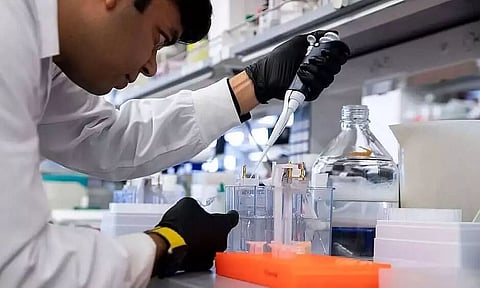
- Home
- Live Blog
- Breaking News
- Top Headlines
- Cities
- NE News
- Sentinel Media
- Sports
- Education
- Jobs

GUWAHATI: The Regional Medical Research Centre for NE Region (ICMR-RMRC, Dibrugarh) situated at Lahowal, Dibrugarh RMRC, Dibrugarh has successfully isolated the SARS-CoV-2 (COVID-19) virus in their BSL-3 Lab. Moreover, the Centre has been supporting all the Northeast States in the fight against COVID-19.
The significance of the COVID-19 virus isolation by the team of scientists from RMRC, Dibrugarh, is that live and viable SARS-CoV-2 (COVID-19 virus) can now be produced in the laboratory in abundance and as and when required.
This is important for the development of inactivated COVID-19 vaccine where virus grown in laboratory are inactivated by heat or chemical and purified for use as vaccines after pre-clinical and clinical trials.
Further, apart from vaccine development, the potential uses of cultures of SARS-CoV-2 includes drug screening for potential drugs or drug candidates against the virus, testing effectiveness of disinfectants, use in development of therapeutic antibodies etc.
RMRC, Dibrugarh is the third government laboratory in the country after NIV (ICMR Lab), Pune and CCMB (CSIR lab), Hyderabad and the fourth laboratory overall after the Bharat Biotech (Pvt Biotechnology lab at Hyderabad), to isolate the virus in tissue culture. The scientists of RMRC, Dibrugarh, Dr Borkakoty and his team member (Dr Jakharia), has isolated the COVID-19 virus (SARS-CoV-2) in VERO-CCL81 cell line in the BSL-3 level lab available at their institute.
They used an immortal cell line — VERO-CCL81 (derived from Kidney epithelial cell lines from green African monkey) — which expresses the important ACE2 receptor needed by SARS-CoV-2 for cellular entry.
Significantly, Bharat Biotech (a company based in Hyderabad) in collaboration with ICMR-NIV Pune (which supplied the virus grown in tissue culture), has developed an inactivated COVID-19 vaccine (COVAXIN) which will go for Phase I and Phase II human clinical trials starting in July.
The COVID-19 virus which is just over six-months old has spread across all human communities and scientists now have detected over 10 different clades or strains circulating around the world. Originally only two types of the virus were noted, the L-type and the S-type but the S-type is slowly disappearing.
Dr Borkakoty and his team at RMRC Dibrugarh in April this year also developed an in-house test (TSP-PCR) to detect the L or S type of the virus within 3 hours. It was found that all strains circulating in Assam were L-type.
However, now scientists have classified the virus into different clades (O, A1, A2a, A3, B,B1, and so on) which differ from one another very minutely. The A2a clade is now the most dominant one across the world including India. In fact the world over, the SARS-CoV-2 virus strains circulating differs by less than 0.3%. So, the strain variations till now in different geographical regions of the world should not pose a problem for vaccine development, stated a release of ICMR-RMRC, Dibrugarh.